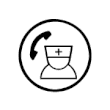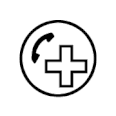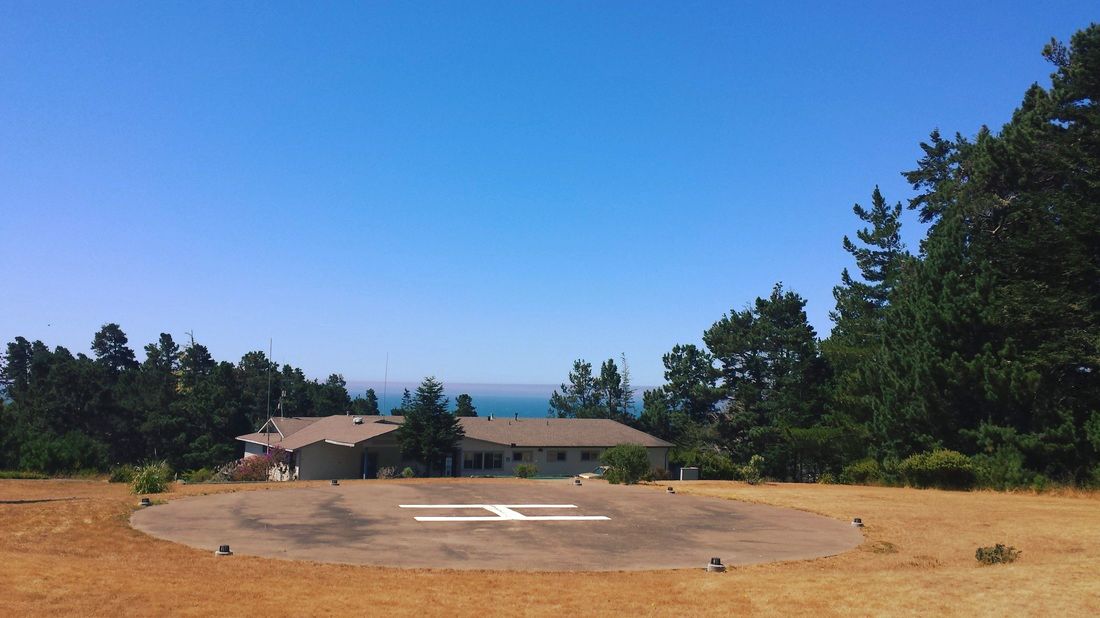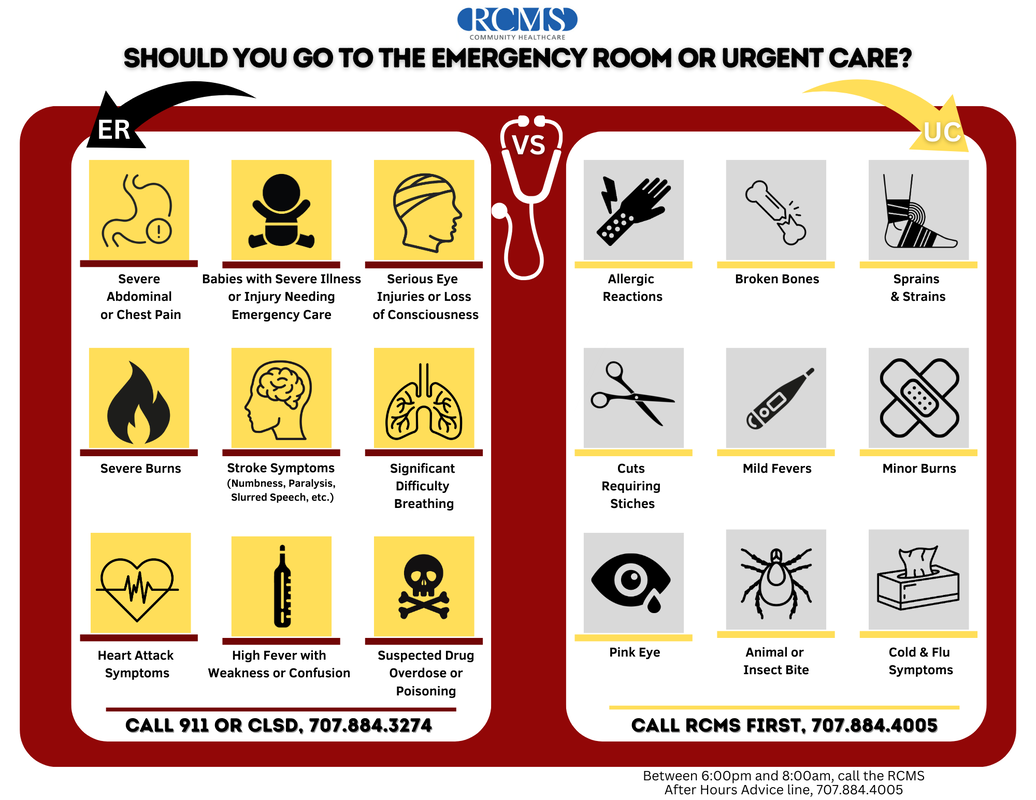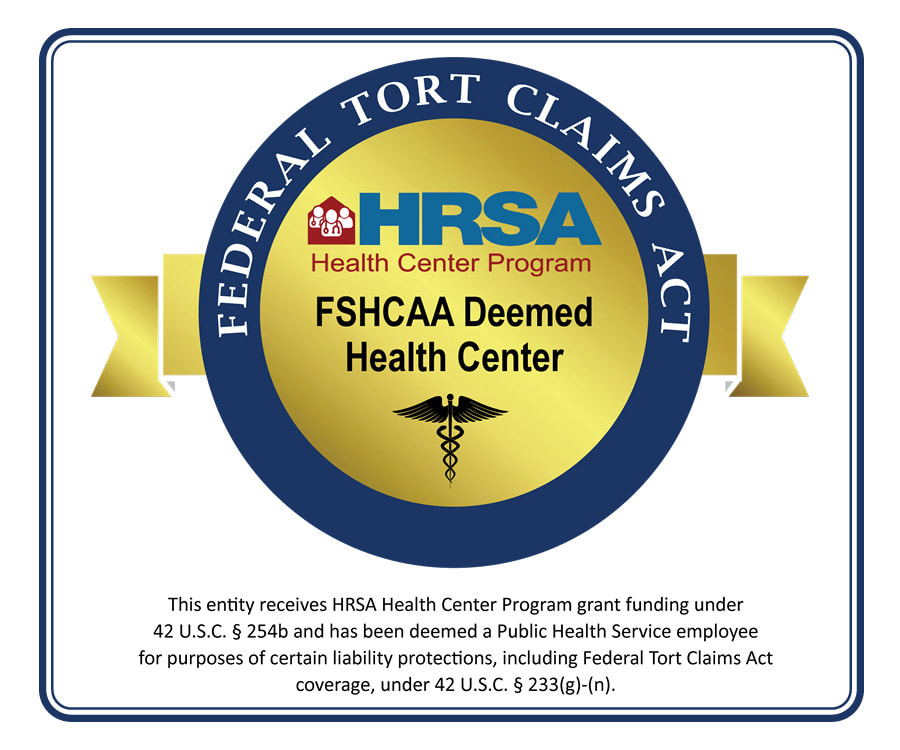If you are experiencing Coronavirus symptoms (fever, cough, shortness of breath), DO NOT come directly to the clinic. Please call us first at (707) 884-4005. We will triage you over the phone and make a plan for your care. RCMS is following recommendations of the Centers for Disease Control (CDC) and our county and state health departments in response to the novel Coronavirus (COVID-19). See the latest notices on our COVID-19 page.
Urgent Care
Ambulance Service Providers
Coast Life Support District (www.clsd.ca.gov) provides paramedic and EMT-based ambulance services and responds to 911 calls in Southern Mendocino and Northern Sonoma Counties.
AirMedCare Network (www.airmedcarenetwork.com) provides emergency air transport in our community and offer annual memberships that cover the cost of an emergency flight. Membership costs just $65 a year for an entire household and covers out-of-pocket expenses for a medically-necessary flight by any AirMedCare Network provider.
AirMedCare Network (www.airmedcarenetwork.com) provides emergency air transport in our community and offer annual memberships that cover the cost of an emergency flight. Membership costs just $65 a year for an entire household and covers out-of-pocket expenses for a medically-necessary flight by any AirMedCare Network provider.
Urgent Care vs. Emergency Room
|
The information below will help you determine if it is better to go to the ER or to Urgent Care. When in doubt, always call 911!
|
When to go to the Emergency Room
You should go to the ER for the following acute, sudden-onset symptoms and conditions, or traumatic injuries:
- Severe physical trauma, such as from a car accident, broken bones or dislocated joints
- A sudden and severe headache
- Any severe pain, especially in the abdomen or starting halfway down the back — it could be appendicitis requiring emergency surgery
- Symptoms of a heart attack: including sudden or persistent chest pain, the feeling of a heavy weight on your chest, pain radiating down one or both arms as well as any of the lesser known symptoms of heart attack that women more commonly experience
- Uncomfortable pressure, squeezing, fullness or pain in the center of your chest. It lasts more than a few minutes, or goes away and comes back.
- Pain or discomfort in one or both arms, the back, neck, jaw or stomach.
- Shortness of breath with or without chest discomfort.
- Other signs such as breaking out in a cold sweat, nausea or lightheadedness.
- As with men, women's most common heart attack symptom is chest pain or discomfort. But women are somewhat more likely than men to experience some of the other common symptoms, particularly shortness of breath, nausea/vomiting and back or jaw pain.
- Severe shortness of breath, difficulty breathing, severe heart palpitations
- Sudden clumsiness, loss of balance or fainting (for no apparent reason such as during physical exertion)
- Sudden difficulty speaking, trouble understanding speech, weakness or paralysis especially on one side of the body
- Sudden vision change, including blurred vision, double vision or full to partial vision loss
- Sudden testicular pain and swelling
- Vaginal bleeding during pregnancy
- Seizures without a previous diagnosis of epilepsy Severe and persistent diarrhea or vomiting
- Any head or eye injury
- Newborn baby with a fever (a baby less than 3 months old with a temperature of 100.4 degrees or higher needs to be seen immediately)
- Coughing up blood, blood in vomit or bright red blood in stool
- Altered mental status or confusion, including suicidal thoughts
When to go to Urgent Care
Urgent care centers are for patients whose illnesses or injuries don't present as life-threatening, but who can't wait until a primary care physician can treat them.
Go to the urgent care for the following kinds of symptoms and conditions:'
When to go to urgent care vs. the ER: While there is overlap in the kinds of conditions urgent cares and ERs treat, ERs are located in fully functioning (24/7/365) hospitals. If you have symptoms of a potentially life threatening condition such as a stroke or heart attack, or are experiencing acute or severe symptoms of an illness, you should go to the ER instead of the urgent care.
Go to the urgent care for the following kinds of symptoms and conditions:'
- Fever without a rash
- Non-life threatening allergic reactions
- Ear pain
- Painful urination
- Persistent diarrhea
- Sore throat
- Vomiting
- Minor trauma, like sprains or shallow cuts
When to go to urgent care vs. the ER: While there is overlap in the kinds of conditions urgent cares and ERs treat, ERs are located in fully functioning (24/7/365) hospitals. If you have symptoms of a potentially life threatening condition such as a stroke or heart attack, or are experiencing acute or severe symptoms of an illness, you should go to the ER instead of the urgent care.
When to go to the Doctor (your Primary Care Physician)
Family doctors play a vital role in the healthcare system. In 2015, around 192 million people visited their general and family care practitioner. That's about 19.5% of all physician's office visits for the yea r.10
Go to your primary care physician for the following kinds of symptoms and conditions:
Diagnostics and screenings — Your primary care physician is a generalist, patient educator and care coordinator. If you go to your primary care doctor reporting symptoms they will ask you questions, perform a physical examination, order up lab work or possibly X-rays, and write prescriptions to help manage symptoms. Then refer you out for further testing and treatment if necessary.
Referral to specialists — Your primary care doctor may not be current on the latest research into treatment of sciatica pain or be able to perform hernia surgery, but they can send you to a specialist who can. And even if you're sure your foot pain is caused by plantar fascitis, you may still need to go through your primary physician to be referred to a podiatrist.
Preventive health care such as annual wellness visits — While you may only visit an urgent care center or ER when you need acute care, your family doctor's role includes preventive health services such as annual wellness exams, vaccinations, cholesterol and cancer screenings.
Go to your primary care physician for the following kinds of symptoms and conditions:
- Cough, cold, flu
- Ear infections and sore throat
- Minor injuries like sprains, bumps and bruises
- Skin problems
- Urinary tract infections
- Allergies and asthma
- Arthritis
- COPD
- Heart disease
- High blood pressure
- Diabetes and obesity
- Substance abuse
Diagnostics and screenings — Your primary care physician is a generalist, patient educator and care coordinator. If you go to your primary care doctor reporting symptoms they will ask you questions, perform a physical examination, order up lab work or possibly X-rays, and write prescriptions to help manage symptoms. Then refer you out for further testing and treatment if necessary.
Referral to specialists — Your primary care doctor may not be current on the latest research into treatment of sciatica pain or be able to perform hernia surgery, but they can send you to a specialist who can. And even if you're sure your foot pain is caused by plantar fascitis, you may still need to go through your primary physician to be referred to a podiatrist.
Preventive health care such as annual wellness visits — While you may only visit an urgent care center or ER when you need acute care, your family doctor's role includes preventive health services such as annual wellness exams, vaccinations, cholesterol and cancer screenings.

